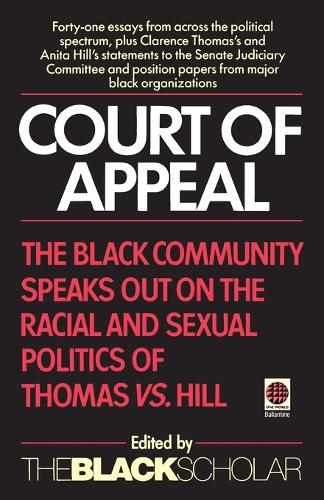
Court of Appeal: The Black Community Speaks Out on the Racial and
(Paperback)
Publishing Details
Court of Appeal: The Black Community Speaks Out on the Racial and
By (Author) Black Scholar
Random House USA Inc
Ballantine Books Inc.
1st December 1992
United States
Classifications
General
Non Fiction
Legal systems: courts and procedures
305.896
Physical Properties
Paperback
336
Width 140mm, Height 216mm, Spine 13mm
397g
Description
Forty-one essays from across the political spectrum, plus Clarence Thomass and Anita Hills statements to the Senate Judiciary Committee and position papers from major black organizations
Despite the intense media coverage of the confirmation hearings of Supreme Court Justice Clarence Thomas, one aspect seemed continually sidestepped: the response of African Americans to this televised investigation of race, gender, sexuality, and, especially, the black psyche and intra-racial politics. When the dust settled, and Thomas was confirmed, what did it mean for the black community
Robert Chrisman and Robert L. Allen, the editors of The Black Scholar, the most influential intellectual publication for African Americans, have assembled all the material relevant to understanding the Thomas hearings: a complete chronology of the confirmation process, the statements of both Professor Hill and Justices Thomas, and essays by prominent African Americans, including Maya Angelou, Derrick Bell, Julian Bond, Rosemary Bray, Beverly Guy-Sheftall, Calvin Hernton, Gloria T. Hull, June Jordan, Maulana Karenga, Julianne Malveaux, Orlando Patterson, Barbara Smith, Robert Staples, Ronald W. Walters, and Sarah E. Wright.
This provocative collection examines such issues as how African Americans perceive their interests; the disturbing sexual backlash against Professor Hill and what it says about the position of black females; the inability of some members of the Judiciary Committee to comprehend the nature of sexual harassment; the continuing confusion and fixation of white America on black sexuality; and the character, goals, and values of the new generation of post-civil-rights blacks.
Representing voices from arch conservatives to liberals to radicals, this books reaffirms that the black community is the final court of appeal in this great debate.
